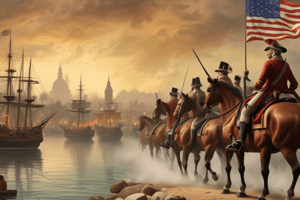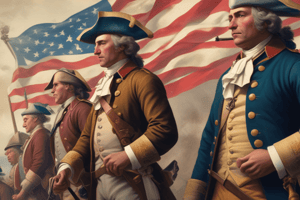Podcast
Questions and Answers
John ______ helped establish the Jamestown colony in 1607.
John ______ helped establish the Jamestown colony in 1607.
Smith
William ______ wrote History of Plymouth Plantation.
William ______ wrote History of Plymouth Plantation.
Bradford
John Winthrop envisioned the Massachusetts Bay Colony as a 'city upon a ______.'
John Winthrop envisioned the Massachusetts Bay Colony as a 'city upon a ______.'
hill
The ______ Church was the official church of England.
The ______ Church was the official church of England.
The economic system of ______ emphasized government control and maximizing exports.
The economic system of ______ emphasized government control and maximizing exports.
______ was an agricultural technique involving the planting of corn, beans, and squash together.
______ was an agricultural technique involving the planting of corn, beans, and squash together.
The ______ System granted land to individuals who paid for an indentured servant's passage.
The ______ System granted land to individuals who paid for an indentured servant's passage.
The Proclamation Line of 1763 prohibited colonial settlement west of the ______ Mountains.
The Proclamation Line of 1763 prohibited colonial settlement west of the ______ Mountains.
The ______ Acts were laws passed to regulate colonial trade.
The ______ Acts were laws passed to regulate colonial trade.
The signing of the Mayflower ______ occurred in 1620.
The signing of the Mayflower ______ occurred in 1620.
The ______ of Paris in 1783 recognized American independence.
The ______ of Paris in 1783 recognized American independence.
The ______ Tea Party was a protest against British taxation in 1773.
The ______ Tea Party was a protest against British taxation in 1773.
The ______ of Rights was ratified in 1791 as the first ten amendments to the Constitution.
The ______ of Rights was ratified in 1791 as the first ten amendments to the Constitution.
The ______ of 1763 was established to limit colonial expansion beyond certain borders.
The ______ of 1763 was established to limit colonial expansion beyond certain borders.
Thomas Paine published ______ in 1776, influencing public opinion towards independence.
Thomas Paine published ______ in 1776, influencing public opinion towards independence.
The ______ Congress convened in 1774 to address colonial grievances against British rule.
The ______ Congress convened in 1774 to address colonial grievances against British rule.
Flashcards
Puritanism
Puritanism
English Protestants wanting to purify the Church of England.
Separatism
Separatism
English Protestants who wanted to separate from the Church of England.
Mercantilism
Mercantilism
Economic system, focused on government control and maximum exports.
Three Sisters Farming
Three Sisters Farming
Signup and view all the flashcards
Indentured Servitude
Indentured Servitude
Signup and view all the flashcards
Head Right System
Head Right System
Signup and view all the flashcards
Proclamation Line of 1763
Proclamation Line of 1763
Signup and view all the flashcards
Anglican Church
Anglican Church
Signup and view all the flashcards
Navigation Acts
Navigation Acts
Signup and view all the flashcards
Amendments
Amendments
Signup and view all the flashcards
Jamestown Founding (1607)
Jamestown Founding (1607)
Signup and view all the flashcards
Declaration of Independence (1776)
Declaration of Independence (1776)
Signup and view all the flashcards
Boston Tea Party (1773)
Boston Tea Party (1773)
Signup and view all the flashcards
Constitutional Convention (1787)
Constitutional Convention (1787)
Signup and view all the flashcards
Treaty of Paris (1783)
Treaty of Paris (1783)
Signup and view all the flashcards
Study Notes
Early American History
- John Smith helped establish Jamestown in 1607, the first permanent English settlement in North America. He interacted with Native American tribes in the Chesapeake Bay area.
- William Bradford was a Pilgrim leader and governor of Plymouth Colony; he documented Pilgrim experiences in his History of Plymouth Plantation.
- The Pilgrims, English Separatists seeking religious freedom, established Plymouth Colony.
- The Mayflower Compact (1620) established a basic system of self-governance for the Plymouth Colony, based on the consent of the governed.
- The Declaration of Independence (1776) declared the separation of the 13 American colonies from Great Britain, proclaiming all men are created equal with rights to life, liberty, and the pursuit of happiness.
- The Bill of Rights (1791) is the first ten amendments to the U.S. Constitution, guaranteeing fundamental rights like freedom of speech, religion, press, and the right to bear arms, and protection against unreasonable searches.
- The U.S. Constitution (1789) is the supreme law of the land, establishing the framework for the U.S. government and defining federal powers and individual rights.
- The Articles of Confederation (1777) was the first governing document of the United States, but it was considered weak and inadequate.
- The Great Compromise (1787) resolved disputes between large and small states over representation in Congress, creating a bicameral legislature (Senate and House of Representatives).
- The U.S. government has three branches: legislative (Congress), judicial (courts), and executive (President).
- Capitol Hill is the location of the U.S. Capitol building, housing the legislative branch.
- John Winthrop, first governor of the Massachusetts Bay Colony, envisioned the colony as a "city upon a hill".
Puritanism and Pilgrims
- Puritans were English Protestants seeking to purify the Church of England, believing in predestination and a strict moral code.
- Pilgrims were English Separatists who believed in separating from the Church of England.
- Puritans played a major role in founding New England colonies.
- The Anglican Church was the official church of England.
- Jamestown, established in 1607, struggled due to disease, conflict with Native Americans, and leadership.
- The Massachusetts Bay Colony, founded in 1630, was more successful.
- Indentured servants were a source of labor for early colonies.
- Bacon's Rebellion (1676) highlighted tensions between wealthy landowners and poor farmers in Virginia.
Colonial Conflicts and Events
- Mercantilism was a prevalent economic system that emphasized government control of trade.
- The Boston Massacre (1770) illustrated British oppression and fueled the independence movement.
- The Boston Tea Party (1773) protested the Tea Act, which granted the British East India Company a monopoly on tea trade.
- The Seven Years' War (French and Indian War, 1756-1763) impacted American colonies and led to British revenue-raising measures.
- Common Sense, by Thomas Paine (1776) influenced public opinion towards independence.
- The Stamp Act (1765) was a tax on printed materials in American colonies, sparking widespread protests and boycotts.
- The Intolerable Acts (1774) were punitive British laws in response to the Boston Tea Party.
Key Documents and Figures
- The Declaration of Independence (1776) declared the colonies' separation from Great Britain.
- The U.S. Constitution (1789) established the framework of the U.S. government.
- The Bill of Rights (1791) added fundamental rights to the Constitution.
- George Washington was the commander-in-chief of the Continental Army during the Revolutionary War, and the first U.S. President.
- Thomas Jefferson was the principal author of the Declaration of Independence, and the third U.S. President.
- Benjamin Franklin played a significant role in colonial affairs and American independence.
- Important dates included founding of Jamestown (1607), signing of the Mayflower Compact (1620), the signing of the Declaration of Independence (1776) , founding of Boston, ratification of the U.S. Constitution (1789) and the Bill of Rights (1791).
Studying That Suits You
Use AI to generate personalized quizzes and flashcards to suit your learning preferences.




